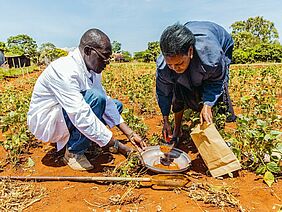(17.09.2021) Our agricultural and food systems face immense challenges, including climate change, biodiversity loss, degradation of natural resources, growing inequality and a series of human health and nutrition issues. Agroecology offers promising pathways towards sustainability, resilience and equity and allows for the production of sufficient healthy food for all in healthy environments.
Co-created evidence and innovations are of outstanding importance to convince diverse stakeholders of the systemic merits of agroecology and for bringing agroecology to scale. The "Money Flows" report (2020) by Biovision and IPES-Food showed that agroecological research is drastically underfunded and identified a lack of visibility and recognition for systemic transdisciplinary projects as a key barrier for changing this situation. Therefore, the foundations Biovision and Agropolis established a partnership to award the SHIFT Prize for Transformative Agroecological Research for Development. The award ceremony will be held at the Agroecology Europe Forum 2021 in Barcelona in mid-November.
An independent jury consisting of internationally renowned experts selected the project "Farming Systems Comparison in the Tropics" (SysCom) from 28 excellent applications, particularly due to its outstanding collaborative and systemic approach and holistic manner of addressing food system challenges. As the jury member Olivia Yambi, a senior expert on nutrition and sustainable development, puts it: "[SysCom] provides evidence for food systems transformation and contributes to the debate and potential policy changes to support agroecology, organic agriculture and diversity […]."
A core component of the SysCom project are the long-term experiments (LTEs) that compare different agricultural production systems in three tropical countries for already fifteen years, allowing for monitoring sustainable changes from different perspectives. The LTEs are complemented by participatory on-farm research on innovations adapted to local farmers’ conditions. The SysCom coordinator and Head of Department for International Cooperation of FiBL, Beate Huber expressed that: "The award is an excellent motivation for our team, and it comes at the right moment: we have just completed an extensive midterm review with all partners where we concluded that we want to engage stronger in national and supra-national policy dialogues on the sustainable transition of the food systems. The SHIFT prize will help us gain awareness and link up with respective networks."
SysCom won by a narrow margin against the two other finalists Malawi Farmer-led Agroecology Initiatives and Towards Food Sustainability for the prize.
Matthias Geck, programme manager at Biovision responsible for the SHIFT prize was very impressed by the quality and transformative potential of the different projects applying for the award: "SysCom creates crucial evidence on the effectiveness of agroecology and organic farming in addressing local food system challenges. In combination, the three finalists truly embody our vision of a paradigm change in the way agricultural research for development is conceptualized and implemented."
Further information
Contact
- Beate Huber
- Seraina Siragna
Links
- systems-comparison.fibl.org: Project website SysCom
- biovision.ch: Website of the foundation Biovision
- agropolis-fondation.fr: Website of the Agropolis Foundation




